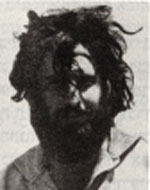Gideon, son of Sarah and Aryeh, was born on February 25, 1952, in Jerusalem. When he was six years old, he traveled with his family to the United States where he studied in the first class. At the end of the year the family returned to Israel and Gidi continued his studies at the Rehavia Gymnasium. Six years later, the family returned to the United States. Gidi did his eighth grade in an American school where he had to reconnect new friends and adapt to a new language and way of life. When he returned to Jerusalem with his family, he continued his studies in the real track at the Rehavia Gymnasium until he completed it and gave him a matriculation certificate. A curious boy was thirsty, indecisive and introverted. He wanted to know, to investigate and to reach truths that were transcendent of his age but which he did not like, and perhaps were not, beyond his comprehension. His desire to delve deep into things, his young age and his high level, as if they had joined together, were expressed in interesting leaps, from hobby to hobby, as well as the dispersion of his possessions in all directions, to his parents’ dismay. There were jokes about Gidi’s disorder, but in every confrontation with his friends and adults, his goodness, honesty, honesty, cheerfulness, and good humor stood out. Everyone liked and respected Gidi because of his qualities. Gideon was drafted into the Israel Defense Forces in February 1970 and tried to volunteer for the Israel Air Force, but was rejected for a partial color blindness, when he was assigned to the Armored Corps. Having given his life to the tanks, it was a bitter disappointment that had depressed him for months. At the end of his first year of service in the IDF, he was sent to a training course for armored personnel carriers. He completed this course as an outstanding trainee. In the middle of 1971, he was sent to the officers’ course and even graduated with a high grade and was appointed as a platoon commander. During his regular service, his mother became ill and shortly before he completed his service, she died. Gidi loved it very much. Even though his grief had overcome him, it was clear that his mother’s illness and death had shocked and drowned him. The opinion of his commanders was: “A good officer, responsible and dedicated in carrying out his duties.” At the end of December 1972, Gidi was released from regular service and returned to his studies in mathematics (accelerated track) and physics at the Hebrew University of Jerusalem. He excelled in his studies and stood out for his originality. Was not satisfied with answering questions, but wanted to understand things, and with rare intellectual honesty for his age, he refused to say that he understood anything until he realized it to the end. He graduated with honors and his teachers predicted a bright future for him. However, he did not shut himself up in school; He had deep ties of friendship and everyone respected him for his consideration of others, his patience and his willingness to undertake burdensome debts. Surprisingly, though, he became orderly. On the Day of Atonement, while he was sitting, tense and alert, next to the radio and waiting for a call from his unit, he wrote to his father, who was abroad: “When I write this letter, the radio starts to sound alarms … Everyone sits and listens … To you things will certainly be clarified. I sincerely hope that this new confrontation between us and our neighbors will bring about the desired peace and the lowest price possible. According to what I know about the IDF’s plans to prevent a limited and exhausting confrontation, I assume that today’s events will lead to a great campaign and far-reaching consequences, and again I hope for a few damages. – by the development of events. ” Gidi was sent to Sinai as a platoon commander in the Armach company in the “Ehud” battalion. He participated in the braking battles and in the campaign to hold the bridgehead. When the company commander was injured, Gidi took command of her. Gidi fell in a battle near Fayed on the 20th of Tishrei 5740 (20.10.1977)3). For his courage in rescuing casualties under fire, he was awarded the “Medal of Valor,” which is the language of the medal of honor: “In witness and testimony that 2090411 Gideon Dvorecki, of blessed memory, displayed courage in carrying out a combat duty with great trepidation. Description of the incident: On October 17, 1973, at noon, a group of eight paratroopers and tankers, some wounded, remained on the Tartar axis. Our soldiers at the destination were left without ammunition, when enemy fire was fired upon them and the number of wounded increased. In a rescue attempt, the force was hit by missiles. Despite this, Captain Gideon Dvorecki volunteered to rescue the group that was trapped between two burned tanks in his armored personnel carrier. Under cover of smoke grenades thrown from his armored personnel carrier, the late Captain Gideon Dvoretzky entered the area covered by enemy fire and rescued the wounded. A week later he fell in battle. In this act he showed supreme courage, coolness and brotherhood. He was awarded the Medal of Valor in accordance with the Medal of Honor in the Israel Defense Forces 1970. May 1975, Lieutenant General Mordechai Gur, Chief of the General Staff. “Gidi was brought to eternal rest at the Mount- Herzl left behind a father and a sister, and after his fall he was promoted to the rank of captain.
